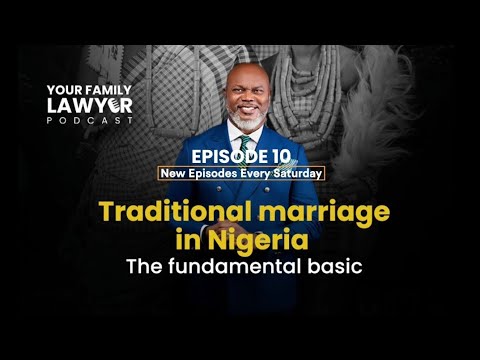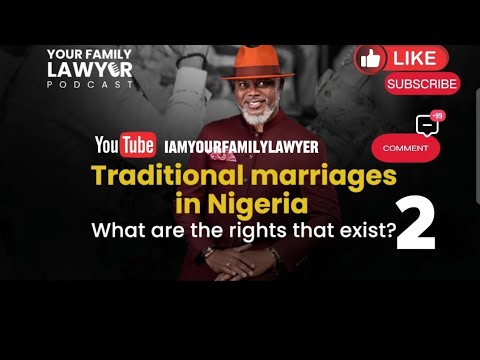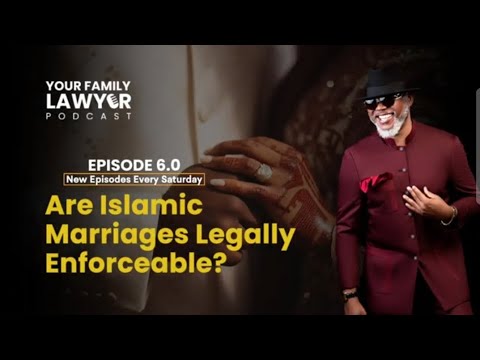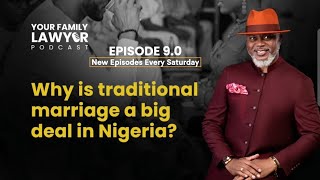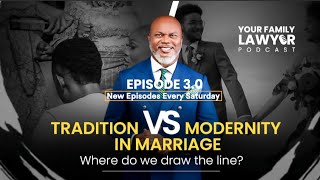Traditional Marriages under Native Law and Custom – Part 2: Regional Variations and Legal Challenges
“Welcome back to Your Family Lawyer, the podcast that helps you understand legal issues in family life. In today’s episode, we’re continuing our discussion on traditional marriages under native law and custom in Nigeria, with a focus on regional variations. That is to say, the cultural variations in the way the various ethnic groups and nationalities in Nigeria conduct traditional marriages.
We’ll explore how the practice of traditional marriage differs from region to region, with unique ceremonies and customs across Nigeria’s diverse ethnic groups and nationalities. Finally, we’ll look into the legal challenges that arise when customary marriages need to be enforced in formal courts.”
Segment 1: Regional Variations in Customary Marriages
“Alright, let’s go! Traditional marriages in Nigeria are as diverse as the country itself. Each region and ethnic group or nationality brings its own unique flavor to the ceremony, making it a vibrant and culturally rich experience.
First, being Igbo myself I would like to give you firsthand knowledge of the fascinating traditional rites of the Igbos in Southern Nigeria.
- Igbo (Southeast Nigeria):
- Iku Aka: The groom’s family visits the bride’s family to formally declare their intentions. This ceremony precedes the Igba-nku. It is the formal ceremony at which the elders of the groom’s family ask for the hands of the bride from her family, usually after investigating the bride’s family clandestinely.
- Igba Nkwu (Wine-carrying Ceremony): The bride searches for her groom with a cup of palm wine and presents it to him, signifying acceptance. This symbolic gesture usually is the high point of the ceremony at which the bride price is paid.
In the various ethnic groups and nationalities across southern Nigeria, traditional marriage processes are rich and vibrant, reflecting the cultural heritage of the various ethnic nationalities. Here’s an overview of the traditional marriage processes in Southern Nigeria:
- Investigation: The groom’s family investigates the bride’s family background, character, and reputation. The bride’s family usually does the same during this period.
- Introduction: The groom’s family formally introduces themselves to the
bride’s family, expressing their interest in marrying their daughter.
- Bride Price Negotiation: The groom’s family negotiates the bride price with the bride’s family. The bride price is a payment made to the bride’s family as a symbol of respect and to seal the marriage.
Of course there are minor differences in the celebration of traditional marriages in the communities, ethnic groups and diverse nationalities comprised in the southern part of Nigeria but essentially, the key ingredients that legitimize the marriage rites are similar in character and context. Let’s name but a few:
- The role of families as the contracting authorities is fundamental to the concept of traditional marriages in all of Southern and even the non-muslim minorities in the central and northern regions of Nigeria.
- The presentation of gifts by the groom’s family and the payment of dowry as the consideration for the traditional contract of marriage are also pervasive in all of southern Nigeria though the quantum may differ. Not too long ago, certain parts of eastern Nigeria were notorious for exorbitant bride prices and patently outrageous lists of items compulsorily required of the groom and his family.
- Preliminary inter-family investigations and visitations, called “knocking of door” in many cultures are also constant features of traditional marriages in these climes.
- Colorful ceremonies to commemorate the conclusion of the marriage rites are prevalent in southern Nigeria particularly so, in the south-west region.
It would appear that the legal status of all traditional marriages are the same in Nigeria. There are however a few socio-legal differences in the rights of women in the various ethnic groups. Whilst in the Igbo land, a woman tends to lose most of her rights, particularly inheritance rights, within her family when she gets married, it is not so in the Efik land. Marriage in Igbo land is viewed generally as a permanent transfer of the female to her husband but in Efik land, the woman knows that despite getting married, her rights in her father’s house are preserved and she is welcome to return if the marriage went south. We will dig deep into this in the next episode.
These diverse practices highlight the rich cultural tapestry of Nigeria. However, when couples come from different cultures, the ceremonies can become even more intricate. Imagine a Yoruba groom marrying an Igbo bride. In general, the convention is that the marriage is performed according to the brides native law and custom. In practice however, the couple might have to blend both traditions, making for a unique and elaborate celebration.”
Segment 2: Case Study – The Osamwonyi Case
“Let’s take a look at the intriguing story which played out in a reported case. The case of Osamwonyi v. Osamwonyi. This case perfectly illustrates how regional differences in customary practices can complicate legal proceedings.
In this case, the petitioner, a surgeon, married the respondent at a Marriage Registry in Lagos. However, the petitioner later filed for divorce, claiming that the respondent was previously married under Benin native law and custom to one Patrick Guobadia. The respondent denied this, stating that no valid customary marriage took place. The court had to determine whether a customary marriage existed under Benin law, focusing on elements like dowry payment and the bride’s consent.”
Screenplay
INT. HIGH COURTROOM – DAY
The JUDGE, a wise and stern figure, sits at the bench. The PETITIONER, a surgeon, and the RESPONDENT are present with their legal teams.
JUDGE
(Seriously)
The petitioner seeks a declaration that the marriage with the respondent is null and void. The grounds are that the respondent was previously married under Benin native law and custom to Patrick Guobadia.
INT. LAGOS UNIVERSITY TEACHING HOSPITAL CAMPUS – FLASHBACK
The PETITIONER and the RESPONDENT live together in harmony until the RESPONDENT leaves for London for an in-service training course.
INT. HIGH COURTROOM – DAY (LATER)
The JUDGE listens as the PETITIONER presents the case.
PETITIONER
(Pleading)
My Lord, the respondent was already married to Patrick Guobadia according to Benin native law and custom when we got married.
RESPONDENT
(Defiantly)
That is not true. There was never a customary marriage between Patrick and me. He paid my father a sum of money without my consent.
INT. CUSTOMARY COURTROOM – FLASHBACK
The respondent’s father stands before the customary court, claiming the dissolution of the marriage between his daughter and Patrick Guobadia. Patrick admits to paying the dowry but no other marriage rites were performed.
INT. HIGH COURTROOM – DAY (LATER)
Two experts on Benin native law and custom, HAWDON OMOAGBE UWAIFO and DR. J. U. EGHAREVBA, present conflicting testimonies on the requirement of a bride’s consent in a customary marriage.
UWAIFO
(Traditional)
Under Benin custom, the consent of the bride is not necessary for a marriage to be valid.
EGHAREVBA
(Empathetically)
Consent is crucial. Without it, and without cohabitation, there cannot be a valid customary marriage.
INT. FAMILY HOME – FLASHBACK
Images of family members engaging in ceremonial activities but no scenes of the respondent giving consent or cohabiting with Patrick Guobadia.
INT. HIGH COURTROOM – DAY (PRESENT)
The JUDGE delivers his verdict after considering all the evidence.
JUDGE
After thoroughly reviewing the testimonies and evidence, it is clear that the respondent did not consent to any marriage under native law and custom with Patrick Guobadia. Furthermore, cohabitation, which is a critical component, was absent. The marriage under Benin native law and custom was not proven.
EXT. COURTHOUSE – DAY
The PETITIONER exits the courthouse, contemplating the court’s decision. The RESPONDENT leaves with a sense of vindication.
Narrator
“The case of Osamwonyi v. Osamwonyi highlights the critical need to prove the essential elements of a valid customary law marriage like consent and cohabitation under Benin native law and custom.”
Segment 4: Legal Implications and Challenges
“Now, let’s talk about the legal implications and challenges that arise when enforcing customary marriages in formal courts. One major challenge is the undocumented nature of the marriage rites and the fine details of the diverse customs and practices.
Courts have to rely mostly on witnesses and evaluate the evidence to ensure that the principles of natural justice, equity, and good conscience are upheld. This often means considering the evidence to ascertain that the specific customs of the ethnic group involved were complied with while also ensuring that national laws, especially those protecting fundamental rights, are respected.
For instance, in the case we just discussed, the court had to balance traditional Benin customs with the legal requirements for a valid marriage. The absence of the bride’s consent and cohabitation was a deal-breaker, highlighting the complexity of these cases.”
“In conclusion, traditional marriages in Nigeria are deeply rooted in cultural practices, but when it comes to legal validation, things can get complicated. The informal and undocumented details in customs and traditions add another layer of complexity, making it essential to understand the specific requirements of each ethnic group or nationality.
If you’re planning a traditional marriage or dealing with a customary marriage dispute, make sure you understand the customs and legal obligations involved. Consulting with a legal expert who understands both the cultural and legal aspects can help navigate these complexities.
I trust that today’s episode of Your Family Lawyer has been impactful. Join us next week as we continue our exploration of traditional marriages in Nigeria. Until then, stay informed and stay empowered!” My name is Chuma Chinye, and I am Your Family Lawyer.

